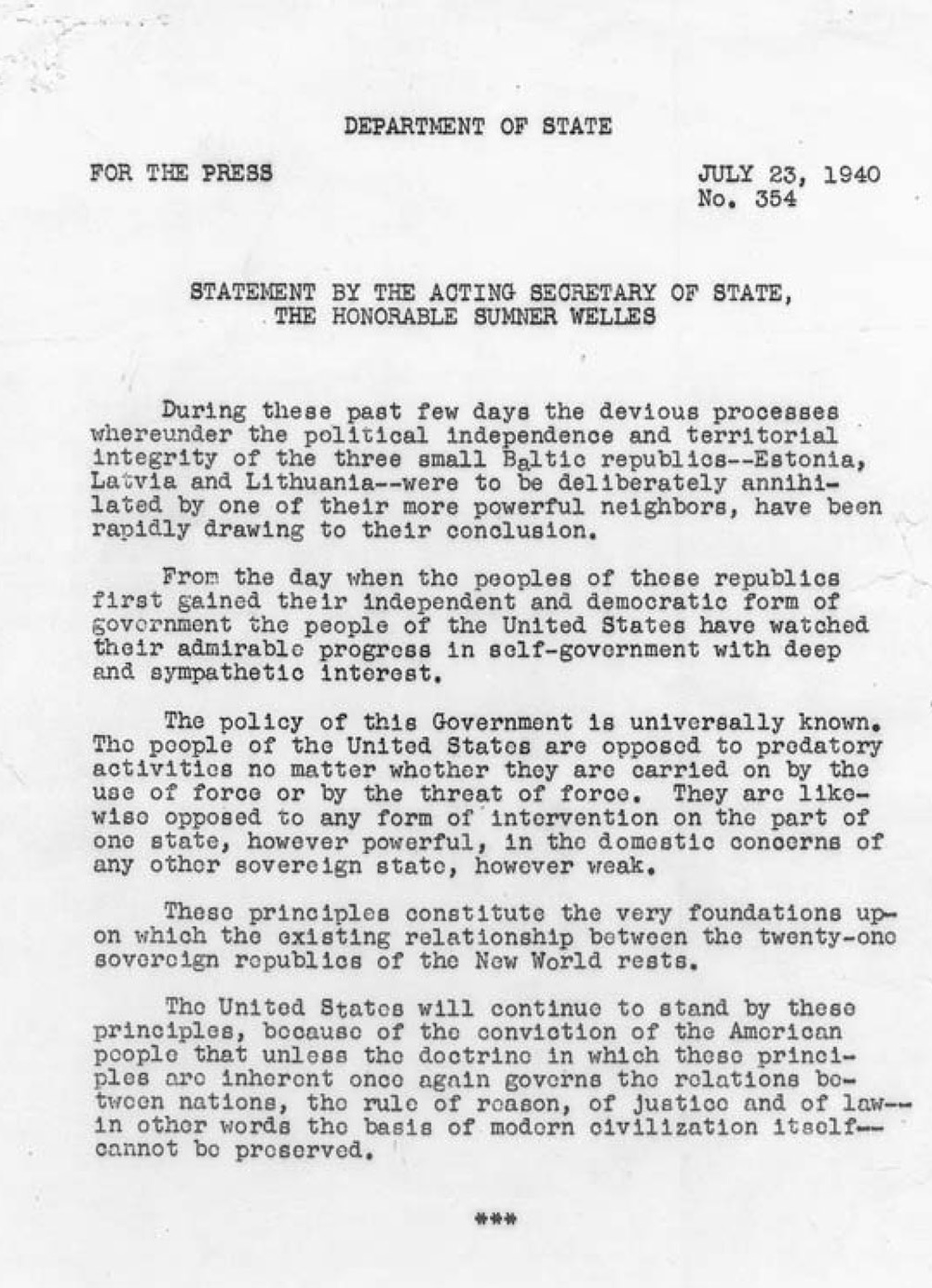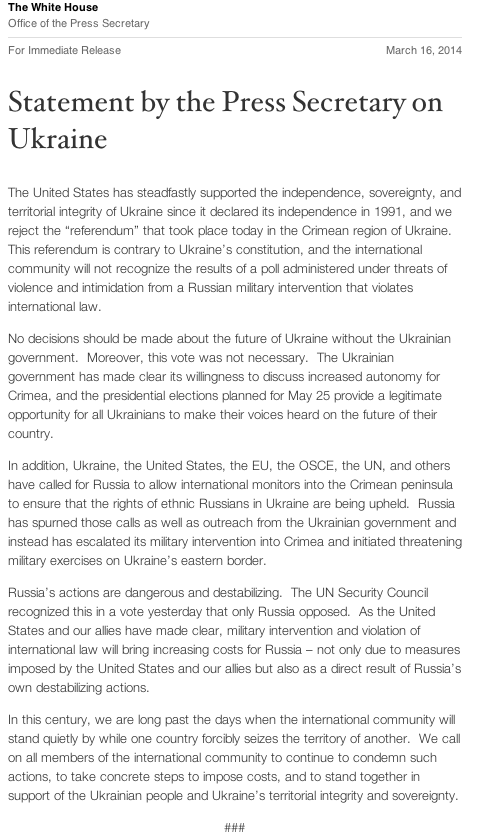BBG Watch Commentary
This week marked the 75th anniversary of the Welles Declaration, one of the most powerful and enduring U.S. public diplomacy documents of the 20th century. Issued on July 23, 1940 by Sumner Welles, the United States’ acting Secretary of State, it condemned the June 1940 occupation by the Soviet Union of the three Baltic states of Estonia, Latvia and Lithuania, and refused to recognize their annexation as Soviet Republics. Even though with regard to the rest of Central and Eastern Europe, the Roosevelt Administration later violated the high principles outlined in the Welles Declaration, the non-recognition of the annexation of the Baltic states by the U.S. Government continued until they regained their independence after the fall of the Soviet Union. At least in 1940, President Roosevelt was still strongly opposed to the Soviet occupation and annexation of the Baltic states.
While the Welles Declaration was not referred to at the time as a public diplomacy statement, as the term was not then in use, it was in the long run a highly successful presentation of U.S. foreign policy principles through which the United States exercised its soft power when a military response was not a reasonable option. For much of the Cold War, the Welles Declaration highlighted long term U.S. foreign policy goals which guided journalists working for the Voice of America (VOA), Radio Free Europe (RFE) and Radio Liberty (RL). Their journalistic work contributed significantly to the success of U.S. foreign policy and public diplomacy even though at times American diplomats tried to influence and hamper such news reporting, especially by VOA, when censoring or suppressing some news appeared more convenient to serve short-term rather than long-term U.S. policies and interests. Ultimately, however, truthful and uncensored reporting and well-informed analysis prevailed.
Today’s Broadcasting Board of Governors (BBG), the U.S. federal agency in charge of media outreach abroad, is not technically and directly responsible for U.S. public diplomacy. The Under Secretary for Public Diplomacy and Public Affairs, the office currently held by Richard Stengel, leads America’s public diplomacy outreach. Richard Stengel represents Secretary of State John Kerry at BBG board meetings. Secretary Kerry is an ex officio member of the BBG board. But under current legislation, the BBG itself is not a public diplomacy agency. Its media organizations, including the Voice of America and Radio Free Europe / Radio Liberty (RFE/RL), are designed to operate as independent news providers protected behind the BBG’s firewall from any foreign policy directives which may come from the State Department or the White House. BBG officials, however, are exercising increasing control over VOA’s and RFE/RL’s budgets and operations. Whether they want to admit it or not, these officials are accountable to no one except only superficially to a part-time bipartisan board. The board has its own conflicts of interest because of private business activities of some of its members in countries like Russia or China. Whether BBG officials want to admit it or not, they are in charge of shaping U.S. public diplomacy and America’s image abroad in addition to whatever the U.S. State Department is doing in its public diplomacy outreach. Unfortunately, these BBG officials are remarkably poorly suited for the job of representing America.
BBG officials themselves are not diplomats and they are not journalists. They are merely accidental U.S. government employees, at least some of them hired or promoted because of their connections to former BBG members, who travel abroad on official business using diplomatic passports while the Voice of America often cannot afford to send its correspondents to cover important news events. BBG officials do not report news, but they make news from time to time. They definitely make many political decisions on behalf of the United States Government and the American people which not only directly and indirectly influence VOA’s and RFE/RL’s news coverage but are also seen abroad as expressions of official U.S. foreign policy and public diplomacy when in fact they are not.
Most BBG officials are not foreign policy experts, and if they had any foreign policy experience, it does not seem to guide their actions. Some may have news reporting or broadcasting experience, but judging by their decisions, they show very little journalistic curiosity. Whether it is public diplomacy or journalism, it is clear that many current Broadcasting Board of Governors officials can’t be trusted not to get the United States Government in trouble.
What would Acting Secretary of State Sumner Welles say to what BBG officials did last year in Crimea which a few weeks earlier had been annexed by Russia just as the Baltic states were annexed by the Soviet Union in 1940? We invite you to compare the Welles Declaration of July 23, 1940 with the BBG press release “Ukraine Political Attitudes Split, Crimeans Turning To Russian Sources For News” issued June 3, 2014.
This is what the Broadcasting Board of Governors — the U.S. federal agency charged with explaining U.S. foreign policy — did in the wake of the illegal Russian annexation of Crimea.
1. BBG officials — U.S. government executives of the BBG’s International Broadcasting Bureau (IBB) who control millions of U.S. taxpayers’ dollars — rushed to conduct a “public opinion poll” in Crimea merely a few weeks after it was occupied and annexed by Russia.
2. BBG officials called a press conference in Washington to announce findings of their misguided and faulty poll.
BBG/IBB executives certainly did not cast any doubts on the validity of their poll or even point out that the United States Government considers the annexation of Crimea by Russia to be illegal and to be against international peace, strategic stability and U.S. interests. They did not say that this was the first annexation by force of a territory of a sovereign European state since the end of World War II.
1. BBG/IBB: “83% of Crimeans felt that the results of the March 16 referendum on Crimea’s status likely reflected the views of most people there”;
2. BBG/IBB: “Most Crimeans (74%) also responded that they believe that life would be better as part of Russia”.
 Not to be outdone, the Voice of America reported based on the heavily promoted but faulty poll:
Not to be outdone, the Voice of America reported based on the heavily promoted but faulty poll:
VOA: “The survey of Crimeans after the Russian takeover showed they are overwhelmingly happy to be part of Russia, with nearly three-quarters of those surveyed saying their life will improve as part of Russia rather than Ukraine.”
VOA: “It is part of Russia now, and you saw that the support is huge for Russian government,” said [Gallup pollster] Esipova.
Possibly influenced by the BBG press release, the VOA report likewise failed to point out that the United States considers the annexation of Crimea by Russia to be illegal. In its report, VOA did not provide any historical or current political analysis of the annexation or the referendum.
It is not surprising therefore that the VOA report generated two pro-annexation comments, possibly from pro-Kremlin trolls, but they could have been also from individuals simply persuaded by this kind of VOA news reporting. There were no other comments for this report. After more than one year on the web, it shows only 17 Tweets and 14 Facebook “Shares.” Such low audience engagement indicators are typical for VOA news in English and in many other languages in recent years. They show that the organization is largely irrelevant on social media after years of program cuts and mismanagement by VOA and IBB executives.
by: Mark
June 06, 2014 12:35 PM“The poll shows that Russia’s decision to reunify with Crimea was in line with the vast majority of the Crimean people. It was not, as often claimed, an annexation. An annexation is ‘the forcible acquisition of a state’s territory by another state’ (Wikipedia)”
by: gen from: Japan
June 06, 2014 10:30 AM“The survey showed what the Ukraine pepole thought is different from the West’s viewes.The West don’t need build arm and support money for the West and US military business.The West don’t need touch the incident happened in Ukraine.The West only misleads the Ukraine people’s decision.”
While most experts would probably agree that the majority of Crimeans supported the annexation in 2014, the support for the Russian occupation of Crimea may not have been as overwhelming as BBG/IBB officials led American and foreign audiences to believe based on their faulty survey. VOA should have by all means reported on the apparent initial strong support for the annexation among ethnic Russians in Crimea, but it should have shown some journalistic curiosity as to whether the poll ordered by the BBG could be viewed as accurate considering the situation on the ground in Crimea. VOA should have provided in its report on the BBG/IBB/Gallup poll at least some historical and political context. At the very least, both the BBG/IBB press release and the VOA report should have quoted from the White House statement declaring the annexation and the “referendum” illegal.
Most of all, however, in line with its stated mission, BBG/IBB and VOA should have made sure that the IBB press release and the VOA news report gave a voice to the voiceless: the Crimean Tatars, ethnic Ukrainians who remained and were living in fear in Crimea, ethnic Ukrainians who became refugees after the Russian invasion, ethnic Russians opposed to the annexation.
The U.S. Congress and American taxpayers have always expected the Voice of America to be a voice of the voiceless. On the other hand, how could the Voice of America under the current broadcasting Board of Governors setup go against BBG/IBB officials who directly control VOA’s budget and wanted to promote their poll’s results?
Ultimately, the bigger question is not what VOA did or did not do but why U.S. taxpayers’ dollars were used by BBG/IBB officials for such a misguided purpose, clearly contrary to U.S. foreign policy and public diplomacy interests. IBB has a $50 million 5-year contract with Gallup which conducts public opinion surveys as ordered by IBB executives. Did they check with the State Department, the Ukrainian Government in Kyiv or independent public opinion analysts before ordering the survey in Crimea? It does not appear that they did. We wrote about it before and we write about it again on the anniversary of the Welles Declaration because it appears that political mistakes by the BBG cadre of bureaucrats who obviously do not even know what the Welles Declaration was still go unrecognized and unaddressed.
Neither BBG officials nor VOA pointed out that the new Russian-rule introduced considerable fear, intimidation and uncertainty in Crimea. No one from the BBG’s International Broadcasting Bureau hinted that those opposed to the annexation might have feared to participate in the survey or were afraid to give honest answers to strangers. Neither BBG/IBB press release nor the VOA news report mentioned the Crimean Tatars, a large indigenous minority strongly opposed to the Russian occupation who were victims of Stalin-ordered mass deportations resulting in genocide. Neither BBG officials nor VOA many any reference to the March 16, 2014 “Statement by the Press Secretary on Ukraine,” which said: “The United States has steadfastly supported the independence, sovereignty, and territorial integrity of Ukraine since it declared its independence in 1991, and we reject the ‘referendum’ that took place today in the Crimean region of Ukraine.”
Independent Russian and Ukrainian social research specialists described the BBG/IBB-ordered survey as highly questionable. An American expert who used to conduct public opinion surveys for the BBG in region said that the poll was unreliable.
While reporting on the poll results, VOA did not bother to interview a Crimean Tatar, a Ukrainian government official or any ethnic Ukrainians living in Crimea. To the credit of the VOA reporter, he did quote the then president of Washington-based Freedom House, David Kramer, who rightly expressed some doubts how the Crimeans might feel about the annexation in the long run, but BBG/IBB officials showed absolutely no doubts about the validity of the survey itself, and neither did VOA.
The IBB deputy director, the then VOA director and his deputy and other senior BBG/IBB and VOA executives showed no concern that the poll might be faulty and that its questionable results might send a misleading public diplomacy message. No one among BBG/IBB and VOA executives seemed apprehensive that conducting a public opinion survey in a territory recently illegally annexed by Russia and asking traumatized Ukrainian citizens sensitive questions without permission from the Ukrainian Government and almost certainly without consulting the White House or the State Department would go against U.S. foreign policy, public diplomacy and national security interests and would send a wrong signal abroad. No one among BBG/IBB and VOA executives thought that it was bad journalism to report on such a poll without raising questions about its accuracy and pointing out the illegal character of the annexation.
Former Acting U.S. Secretary of State Sumner Welles would have turned in his grave if saw how BBG/IBB responded to the annexation of Crimea. He knew the power of public diplomacy and understood the need for making a strong and unambiguous statement in response to a major violation of international law. That’s why we thought that BBG/IBB executives responsible for the 2014 public opinion poll in Russia-occupied Crimea and those who did nothing as its faulty results were being heralded in Washington and around the world by VOA would benefit from familiarizing themselves with the Welles Declaration on its 75th anniversary. Not because we believe that VOA should be engaged directly in public diplomacy, but because we believe that VOA should report news accurately and present the policies of the United States clearly and effectively as required by the VOA Charter.
We are not naive to believe that posting the Welles Declaration alone is going to solve the problem of incompetent BBG, IBB and VOA bureaucrats. They have to be replaced. Although IBB has a new interim management team and VOA has a new interim acting director, other top IBB executives who were in charge last year are still occupying key positions. They are the managers directly responsible for ordering and promoting the Crimean poll or doing nothing to stop promoting it faulty results.
The director who was in charge of VOA last year is gone and one of his deputies has transferred to another position, but to turn around any permanently dysfunctional organization, many experts agree that about 80% of managers have to be fired in addition to making structural changes. In the case of BBG/IBB, simply reducing the managerial staff by 80% would be a great way to start. But the BBG Board, its Chairman Jeff Shell, or any new CEO do not have a legal authority to fire incompetent managers en masse. They seem to be frustrated by their inability to clean house. Only Congress can legislate such a drastic but desperately needed action.
A congressional action is needed especially since some BBG members and most likely any new CEO tend to grow dependent on the cadre of entrenched IBB bureaucrats. As there is nobody else BBG chair and BBG members can turn to, they are forced to rely on those few who can be counted upon to write a good memo or a press release on a short notice no matter how much damage they may have done to the organization and its entities in the past. There is no firm guarantee that any new CEO will be different or more successful in curbing the bloated bureaucracy and its abuses. The BBG/IBB bureaucracy will be his/her power base. It would take a highly unusual and principled individual to do the right thing and cut the bureaucracy to the bone.
The first BBG CEO left after a few weeks on the job. Even if a new CEO is more committed and if he or she turns out to be excellent, in the long run any powerful central bureaucracy will reassert itself after that individual is gone. The IBB’s record alone should be enough to convince anyone that a single Washington government agency cannot successfully run combined Voice of America and surrogate media operations, much less be also responsible for some public diplomacy functions while also doing journalism, digital media outreach and broadcasting. Any new executives hired by the agency should not be in the business of formulating U.S. public diplomacy or micromanaging BBG’s news entities, but they should be at least highly competent journalism and public diplomacy experts who can spot a disaster when they see one.
 In promoting his bill in 1947 to fund the Voice of America, then within the State Department, as well as the State Department’s foreign information exchange programs, conservative Republican Congressman from South Dakota Karl Earl Mundt (later a U.S. Senator), listed a number of safeguards which he thought were absolutely necessary after VOA’s original parent agency, the Office of War Information (OWI), turned out to be an out-of-control, mismanaged and wasteful mega propaganda tool of the White House during World War II. Because of its abuses and mismanagement, OWI was nearly defunded in 1943 by angry members of Congress of both parties and it was promptly disbanded in 1945. During the war, OWI had a hapless CEO, Elmer Davis, who despite his journalistic background was an enthusiastic promoter of unrestrained propaganda. He allowed the agency to be infiltrated by pro-Soviet agents, especially at the Voice of America, same of whom after the war left the United States and became anti-American propagandists for communist regimes in Eastern Europe. The OWI leadership itself was highly sympathetic to Stalin and the Soviet Union, as was the Roosevelt White House. OWI engaged in illegal censorship domestically to eliminate news reporting in the United States unfavorable to the Soviet Union, while VOA also engaged in censorship and frequently promoted Soviet propaganda line abroad without regard for the truth.
In promoting his bill in 1947 to fund the Voice of America, then within the State Department, as well as the State Department’s foreign information exchange programs, conservative Republican Congressman from South Dakota Karl Earl Mundt (later a U.S. Senator), listed a number of safeguards which he thought were absolutely necessary after VOA’s original parent agency, the Office of War Information (OWI), turned out to be an out-of-control, mismanaged and wasteful mega propaganda tool of the White House during World War II. Because of its abuses and mismanagement, OWI was nearly defunded in 1943 by angry members of Congress of both parties and it was promptly disbanded in 1945. During the war, OWI had a hapless CEO, Elmer Davis, who despite his journalistic background was an enthusiastic promoter of unrestrained propaganda. He allowed the agency to be infiltrated by pro-Soviet agents, especially at the Voice of America, same of whom after the war left the United States and became anti-American propagandists for communist regimes in Eastern Europe. The OWI leadership itself was highly sympathetic to Stalin and the Soviet Union, as was the Roosevelt White House. OWI engaged in illegal censorship domestically to eliminate news reporting in the United States unfavorable to the Soviet Union, while VOA also engaged in censorship and frequently promoted Soviet propaganda line abroad without regard for the truth.
It can be safely assumed that VOA did not mention the Welles Declaration after the Soviet Union became America’s ally against Hitler. Most of OWI’s abuses and VOA’s shortcomings during World War II did not become widely known until congressional hearings in the early 1950s. But despite OWI’s and Voice of America’s disastrous World War II record, some of which was already known to him, Congressman Mundt became shortly after the war a strong supporter of VOA and State Department’s foreign exchange programs. He tried hard, however, to make sure that the abuses of wartime OWI and VOA would not continue. This is what he had to say about the bill which later became known as the Smith-Mundt Act of 1948:
Congressman Karl Earl Mundt, June 6, 1947: “We have provided over 20 safeguards in the Mundt bill, not only against infiltration of un-American individuals into the organization which is to be created, but safeguards protecting the economy of America; safeguards providing that Congress be kept informed of what is going on; safeguards providing for guidance and counsel and advice from the private professions and industry to help the State Department develop the best possible type of program; safeguards precluding the employment of aliens except in those areas where Americans are unable to speak the dialect being broadcast; safeguards so that the Voice of America will be spoken by Americans and the spirit of America will be interpreted by loyal American citizens who are enthusiastic, sincere, and able exponents and disciples of our cherished ways of life. We have included safeguards providing that wherever possible the State Department must use private agencies in order to carry out the program; safeguards so that Congress by concurrent resolution can stop the program or any portion of it any time it chooses without a Presidential signature, because we want the Congress and the country to feel secure and convinced that this is a program of Americans broadcasting the voice of America in a manner in which all Americans can be proud of.”
Congressman Mundt also said that under his bill included other safeguards to make sure that VOA and the State Department’s exchange programs would be “no great haven of bureaucracy and no starry-eyed adventure by impractical idealists or theorists.” But he also left no doubt that the Voice of America and foreign exchange programs were needed for what now would be described as a public diplomacy outreach abroad. He delivered a strong message that if the Voice of America will be well and frugally managed, delivers U.S. news and reflects American values, it will be money well spent in support of peace and freedom.
Congressman Karl Earl Mundt, June 6, 1947: “In my opinion, it would be tragic to muffle the Voice of America either by slashing its jugular vein through denying the appropriations required to conduct a United States information service abroad or by darkening the beacon light of American freedom which now shines brightly in some areas and just manages to filter through into others but which all the world today recognizes as the last and best great hope of all mankind to perpetuate the peace and promote sound justice and good will. H. R. 3342 provides the machinery and the methods for projecting the voice and spirit of America not only by short-wave radio but by the printed word, the use of information centers abroad, the friendly visit of invited technicians and by other methods. It also sets up procedures whereby students, scholars, and serious observers from abroad can visit America and learn about our formula of freedom here in the greatest successful laboratory of freedom, tolerance, and self-government the world has ever known.”
While Congressman Mundt was right on many points, he apparently was not well aware at the time of efforts to create U.S. Government-funded surrogate broadcasters which would directly employ many foreign journalists in Europe. He may have not fully appreciated the need for fostering detailed local news reporting and intellectual debate in countries whose citizens were denied free press and other basic freedoms. Established in the early 1950s under a secret funding channeled through the Central Intelligence Agency (CIA), Radio Free Europe and Radio Liberation (later renamed Radio Liberty) became highly successful platforms for free exchange of democratic ideas as well as respected journalistic organizations. In most of the Soviet block, they quickly became more effective than the Voice of America and achieved much higher audience reach because of their local and surrogate status. Their primary purpose, however, was not to serve as a tool of U.S. public diplomacy, which was exactly what Congressman Mundt envisioned for the Voice of America. Being extremely concerned about pro-Soviet influences, however, he did not appreciate the value of native speakers as broadcasters and journalists at VOA.
Generally speaking, many of his proposed safeguards allowed VOA to survive. Many of them were eventually weakened and discarded under the IBB management of the Broadcasting Board of Governors which undermined domestic political support for the Voice of America and made it much less effective abroad.
The photo shows Sumner Welles, acting Secretary of State in July 1940.



